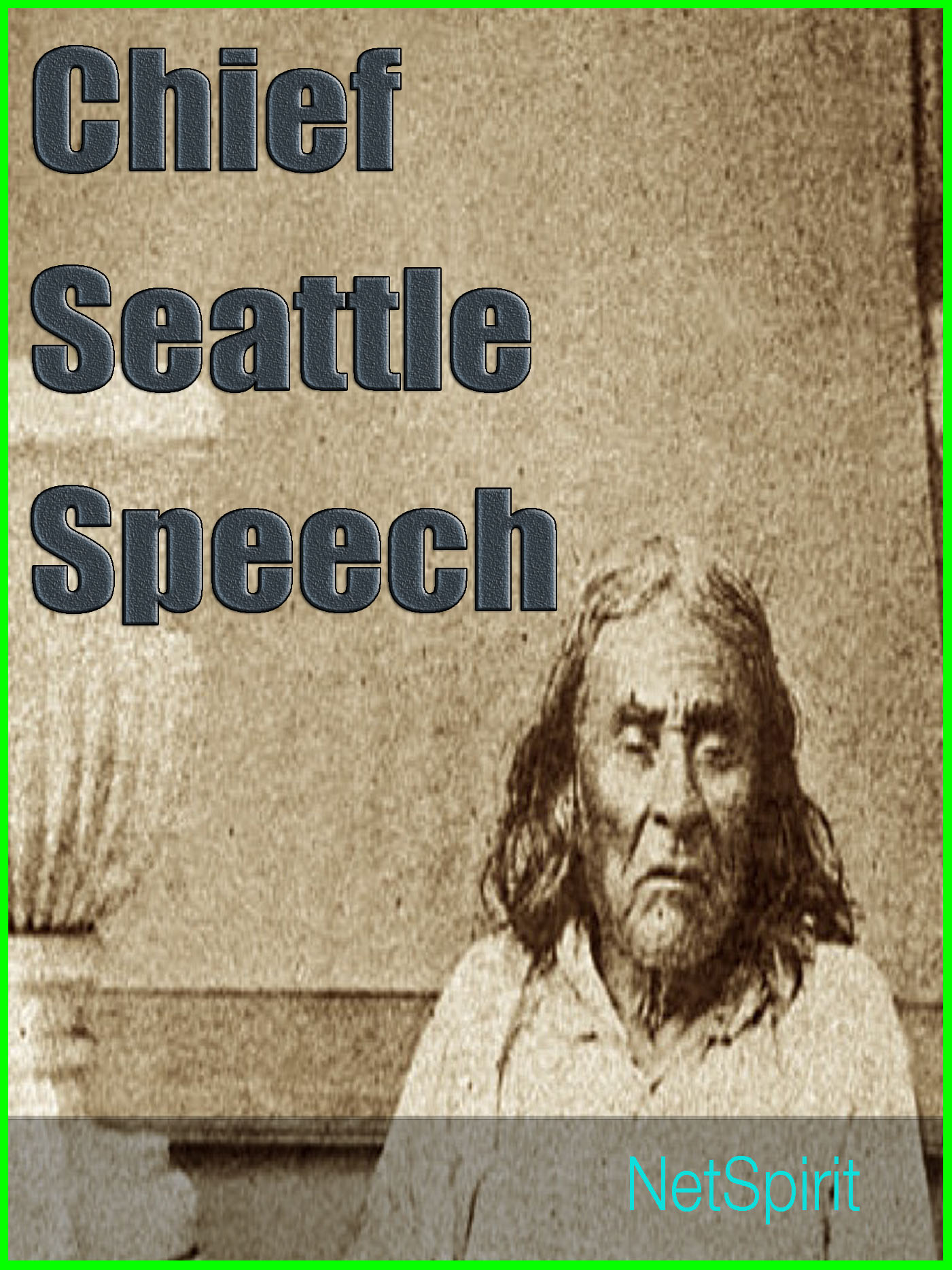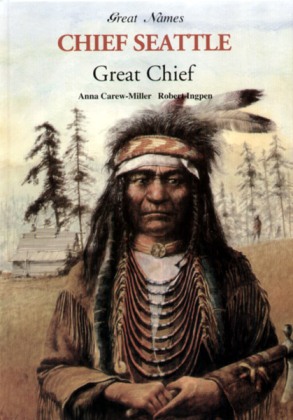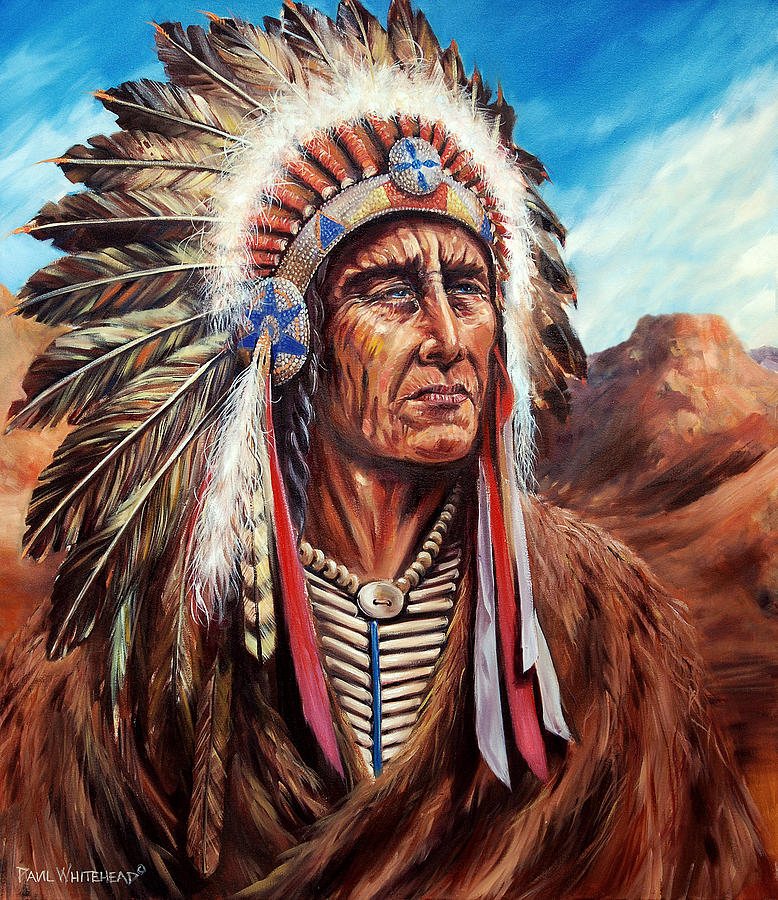Chief Seattle's
Speech
Dr. Henry A.
Smith
ASSIGNMENTS
Context
Questions

I. (i) Chief
Seattle speaks these words. He says that nature (sky) has sympathised with his
(Chief Seattle's) people for many centuries.
(ii) For the
speaker, the days to come would be filled with darkness as the Great Chief at
Washington wishes to buy and control their land. As a result his people would
no longer have rights on their land.
(iii) George
Washington, the First President of the USA is referred to as the "Great
Chief at Washington". He has sent Seattle and his people the proposal to
buy their land with words of feigned "goodwill and friendship".
(iv)
Seattle's words are as reliable and certain as "the return of the sun or
the seasons". His words are like the stars that never change. It shows
Seattle is an honest, reliable and upright man. (v) Chief Seattle sarcastically
condemns the Big Chief's act of sending them greetings of friendship and
goodwill. Chief Seattle realises that Big Chief at Washington is in little need
of their friendship, as his people are stronger and more powerful than the
natives. The Big Chief, according to Seattle, is George Washington.

II (i) As
compared to the White Chief's people, Chief Seattle's people are few. The
speaker illustrates this fact by comparing his people to "the scattering
trees of a storm-swept plain" while the White Chiefs people are as much as
"the grass that covers vast prairies."
(ii) The
White Chief sends a message that he wishes to buy the native's land and he
would allow them enough to "live comfortably".
(iii) Chief
Seattle says that there was a time when his people were as numerous as the
waves of the sea that cover the sea floor.
(iv) Refer
to answer (ii) of II Chief Seattle sarcastically says that the White Chief's
'wish' is just and generous as the natives no longer need respect nor are they
"in need of an extensive country", so it would be really fair of the
Whites to buy the native's ancestral land.
(v) When the
white man began to push the natives westward, they turned hostile towards one
another. They became cruel and relentless. No, they should not take revenge on
the White men because it is not fruitful. In times of war, they lose their own
lives, but the family that wants for them at home bears the loss.

III. (i)
George Washington is referred to as "our father in Washington". He
has become "Our father and your father", since King George has moved
his boundaries further north.
(ii) The
good father promises to protect the natives only if they do as he desires.
"Bristling wall of strength" refers to the vigorous and energetic
white people's brave men who will provide them (natives) strength and will
protect them from their ancient enemies.
(iii) Refer
to Notes, Pages 23. The White Chiefs brave men will provide the natives
strength and his ships would fill their harbours so that Haidas and Tsimshians
will cease to frighten the natives.
(iv) The God
of the Whites protects only the 'paleface children' and forsakes the Red Indian
children. The God of the natives, the Great Spirit has forsaken them. If they
have a common God then he is partial to his European children. They are two
distinct races having separate origins and separate destinies.
(v) Youth is
impulsive and young men often indulge in revengeful acts considering them to be
gainful. It times of war, they even lose their own lives, but the family that
waits for them at home bears the loss. It reflects Seattle's anti-war attitude,
for he does not glorify war but condemns it.

IV. (i) The
God of the natives, the Great Spirit seems to have forsaken them, because he no
longer helps them when they need help the most.
(ii) They
are compared to a receding tide because once they were large in number but now
they are nothing more than a mournful memory. The Great Spirit is no longer a
father figure to them; "they seem to be orphans who can look nowhere for
help."
(iii) (1) He
has forsaken "His Red Children" and protects only the paleface
children;
(2) he makes
the White People stronger every day but does nothing for the well being of the
natives.
(iv) Refer
to Oppression, under Themes, Page 18.
(v) * They
are two distinct races the natives Americans and the White colonists.
* The
natives' origin is the American land that is being contested; the whites here
originally belonged to Europe who came and colonized these native Americans.
* Their
destinies are different the natives are receding every day while the whites are
like the grass that covers vast prairies. * Moreover, refer to the differences
between Tribal belief system and Western belief system, under Themes, Page 19.

V. (i) Red
Man's religion is the "traditions" of his ancestors and belief in the
Great Spirit that teaches them to love this "beautiful world" its
"verdant valleys, its murmuring rivers and its magnificent
mountains."
(ii) Refer
to Red Indians' attachment to their land, under Themes, Page 18.
(iii)
Seattle does not seem to support institutionalised Christianity as it forces
people only to adhere to rules and does not allow them to associate sacredness
and spiritualism with the nature around them.
(iv) Refer
to tribal belief system and western belief system, under Themes, Page 19.
(v) (a) The
ten commandments that were written on tablets of stone and brought down from
Mount Sinai by Moses. They form the basis of the white man's religion.
(b) Refer to
Iron finger, under Notes section, Page 24.
VI. (i) This
is because they never connect with their land and their people spiritually.
Their relationship with their land and their people is not sacred or holy; it
is materialistic. As soon as they die, the link to their earthly life breaks
and thus devoid of spiritualism they are incapable of an afterlife.
(ii) The
dead of the Red Man continue to love their land and their people. They never
forget the world that gave them their being and identity. Moreover the spirits
of the dead keep visiting to guide, console and comfort the living.
(iii) Refer
to II,
(iv) Refer
to Oppression, under Themes, Page 18.
(v) Refer to
Transcendence, under Themes, Page 20.
VII. (i) He
feels as if not a single star of hope hovers above the natives' horizon. The
winds moan and grim fate follows them. Their situation is similar to a wounded
doe that is being hunted down. Moreover he feels, that in a few more years,
their race will disappear. This is how he reflects his unhappiness about the
fate of his people.
(ii) Every
person, tribe, or culture that is risen to great glory would definitely meet
its fall one day and that would surely be the day of justice. Seattle believes
that time will come when the whites would also be moving towards their
inevitable doom.
(iii) This
is a reference to Jesus Christ who, according to Christian (White man's
religion) beliefs, was God. He lived like human beings on earth walking and
talking to other human beings as friends.
(iv) Chief
Seattle believes that White Settlers too will have their decay one day. It
would be then that the White men and Red men would share a common destiny. They
would be brothers only when the whites would be able to empathise with the Red
men.
(v) The
common destiny of man is that his decay is inevitable. Chief Seattle believes
in the common destiny he says — "tribe follows-tribe" — "nation
follows nation" — "order of nature". It is through the White man's
decay that Seattle foresees the unity of all beings. He says: "We may be
brothers after all. We will see."
VIII. (i)
This is because even after the last native has perished last native
"shores will swarm with the invisible dead" of Seattle's tribe. The natives'
love for their land makes them immortal. Thus, the whites will never be alone.
(ii) The
shadowy spirits visit the places at nights when the streets of the Whites'
cities are silent and it is falsely believed that they are deserted.
(iii) The
memory of the tribe would become a myth among the White men "when the last
Red man shall have prised" from the natives' land, but this would be
momentary as it would then "swarm with the invisible dead of the tribe.
(iv) Native
Americans even after death don't forget the world that gave them their being
and identity. They keep on loving its
valleys, its
rivers, its magnificent mountains, and its lakes. The dead feel one with nature
and its surroundings.
(v) Refer to
Transcendence and Environmental concerns, under Themes, Page 20.
image courtesy : thank you Google
Casino Site - Choego Casinos
ReplyDeleteFind the best choegocasino online casinos in Las 온카지노 Vegas. We list the 제왕 카지노 top sites to play and win real money. You can play at these top casinos in our